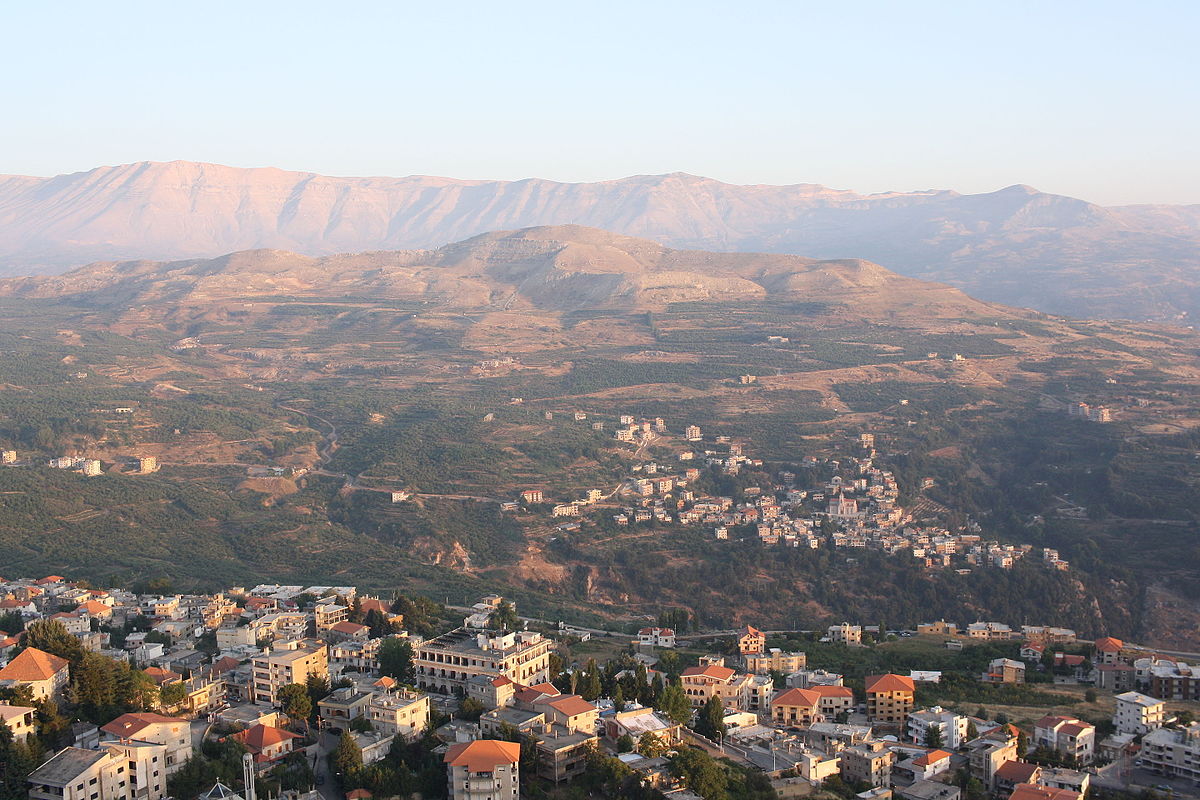Lebanon remains a nation marked by sectarian fault lines and the scars of its violent civil war, however through all of its modern history, common threads have persisted in the nation’s democratic system and key families remain kingmakers and power-brokers throughout its government. In this piece, Edwin Tran continues with his new series examining the political families and dynasties holding power in Lebanon.
For an in-depth, bespoke briefing on this or any other geopolitical topic, consider Encylopedia Geopolitica’s intelligence consulting services.
The nature of Lebanon’s politics is defined by the Taif Agreement, which continued the mandate that various political positions in Lebanon were to be held by specific sectarian groups. The Lebanese presidency, as a result, has always been represented by a Maronite Christian. The position, unlike other parliamentary systems, is given a substantial amount of power and is essential in signing laws, declaring emergencies, and in dissolving parliament. The weight of the Lebanese presidency has resulted in a berth of major political figures, ideologues, and familial powerhouses. Names such as Emile Lahoud and Fuad Chehab rank highly influential among the political currents of Lebanon. In this chapter, we’ll be focusing on one principle family that had secured the Lebanese presidency during the country’s most pressing era: the Frangiehs. Under Suleiman Frangieh, the family ushered in the era of civil war, were prominent members and militia leaders, and were victims to one of the most harrowing events in the entire conflict. Today they are represented today by the Marada Movement, a political organization directly descended from a militant group of the Lebanese Civil War.
The Roots of the Frangieh
The Frangieh family hails from the town of Ehden in northern Lebanon. It is a historic place, having been populated for hundreds (or even thousands according to some) of years. Ehden is known for its ancient churches, small cafes, and distinct seasons that drape the town in a motley of colours and atmospheres. With such a history, the town and its overarching region of Zghorta have been home to prominent families with major political and socioeconomic influences. In the decades before the Lebanese Civil War, the Frangiehs were simply one family among a group of five that exercised significant political prominence in the region. These included the likes of the “Duwaihi, Muawaḍ, Makari, and Karam.” Family archives highlight a certain Gerges Frangieh as the progenitor of the family in Ehden, though a comprehensive timeline of such events is missing. A more important figure of the Frangiehs’ early history in Ehden is Kabalan Frangieh Bey (1872 – 1941), an Ottoman District Governor for the town and a member in the Lebanese Parliament during the days of the French Mandate.
From this early history, the Frangieh connection to Lebanese politics becomes clear. Kabalan’s sons included Hamid Beik Frangieh (1907-1981), a prominent member of the Lebanese Parliament and holder of several key ministries including tenure as the Minister of Finance and Minister of Foreign Affairs. His second son, Suleiman Frangieh (1910-1992), would go on to become the most significant member of the family. From a young age, Suleiman was embedded within the tumultuous politics of the Zghorta region. Rumours circulate that in 1957, Suleiman engaged in raids against the rivaling Dowaihis, and then retreated to Syria where he would begin a crucial relationship with future Syrian President Hafez al Assad. After returning back to Lebanon in the 1960s, Suleiman entered politics. Taking over for his ill brother Hamid, Suleiman would be reelected continuously from 1960 until 1970.
The 1970 Presidential Election would prove to be the most contentious, one that is still considered by many to be the most controversial Lebanon has ever seen. The 1960s were dominated by the weight of President Fuad Chehab, who was known for his reformist and state-heavy policies. The 1970 elections saw two key candidates emerge. On one side was the Chehabist successor Elias Sarkis, and on the other was Suleiman Frangieh. In a dramatic turn of events, Suleiman Frangieh won the presidency after the Druze leader Kamal Jumblatt made a last-minute change with his vote. Many were outraged by the nature of the election, and post-electoral violence would occur in the following years leading up to the Lebanese Civil War. As was the case with other factions, the Frangiehs had founded the Marada Brigade in the years prior. In order to secure the Lebanese presidency, Antoine Frangieh (or known more colloquially as Tony) led the Marada Brigade up the steps of the Lebanese Parliament House and supposedly threatened the officials inside with force.
The Lebanese Civil War and the Ehden Massacre
The outbreak of the Lebanese Civil War coincided with the last years of Suleiman’s presidency. Although some reforms and reconciliation efforts were attempted, it became clear to Suleiman that external forces were needed. In response, Suleiman Frangieh reached out to President Hafez al Assad. On May 1976, the Syrians invaded Lebanon in a move that most Maronites initially approved of as they thought that the Syrians would be effective in keeping the Palestinian Liberation Organisation in line. With Suleiman out of office in September of that year, opinions on the Syrian invasion were beginning to reverse. Syrian attacks in Christian sectors of Beirut and clandestine pressures from Israel began to erode the relationship between the various Maronite groups and the Syrians. Rivalries and tensions flared in the Maronite camp, with Camille Chamoun and the Gemayels beginning to push against the Frangiehs and their policies. By 1978, only Suleiman and those of the Marada Brigade remained close to the Syrians. CIA reports of this time note Suleiman as a “modern feudal baron whose power base centres around kinship ties,” with Ehden and the Zghorta region being considered his own personal fiefdoms.
It is perhaps this recognition by other Maronite factions that resulted in one of the most dramatic incidents of the Lebanese Civil War: the Ehden Massacre. On June 13, members of the Lebanese Forces militia, led by Samir Geagea and Elie Hobeika (both members of Parliament for the Lebanese Forces following the end of the civil war) slipped through Syrian checkpoints and launched a covert invasion of Ehden. By the end of the day, many members of the Marada Brigade were killed, and among the casualties were Tony Frangieh, his wife Vera, and his three year old daughter Jihane. Of the immediate Frangieh family, Suleiman and his grandson (the last living son of Tony Frangieh) Suleiman Jr. were the only ones that remained. Former-president Suleiman, it was reported, declared vengeance on the Gemayels, and “ordered his family not to wear black at [Tony’s] funeral, for that color is worn only after vengeance has been wrought.” Suleiman Jr. Frangieh, when alerted of his father’s death, only asked a single question: “Did he kill many Phalangists?”
Suleiman Frangieh Jr. was then whisked away into Syria for hiding, where he became acquainted with Bashar and Bassel al Assad. A few years later, Hamid Beik Frangieh would pass away. Although Tony’s brother Robert would take the mantle of leadership, the Marada Brigade was undoubtedly crippled and would seemingly collapse at any point. A report by the Washington Post in 1978 discussed the implications of this massacre with Bashir Gemayel, the man who had orchestrated the affair. According to the report, Bashir emphasized the idea that “even if he [died] the Phalange Party will continue, whereas the [Frangiehs were] at the end of the road.”
The Present Perspective
However, in the years following the Lebanese Civil War, the Frangiehs have continued their presence in Lebanese politics. Although Suleiman Frangieh was demoralized and described by many as “depressed” by the loss of his son, he continued onward in offering leadership to the Marada Brigade. In 1988, Suleiman Frangieh even attempted to run for the Lebanese Presidency once more, though this was met by outrage and anger. Substantial changes emerged after the Taif Agreement on 1989, which resulted in the dissolution of most Lebanese militias. Hezbollah and an army led by Maronite leader Michael Aoun were the only two that refused to demilitarise. The Marada Brigades, now led by Suleiman Frangieh Jr., were converted from a militia into a political party focused on securing a Parliamentary seat in the 1992 Lebanese elections. In that same year, Suleiman passed away at the age of 82, and his remains were buried next to the grave of his son, Tony Frangieh.
Suleiman Frangieh Jr. would go in to win consecutive Parliamentary elections in 1996 and 2000 and would win the seat again in 2009 after a brief defeat. Throughout his years in Parliament, Suleiman Frangieh Jr. would act in several ministries, including his tenure as Minister of Public Health from 1996-2004 under Prime Minister Rafiq Hariri. In additional to Suleiman Frangieh Jr., Samir Frangieh, son of Hamid Beik Frangieh, would also partake in Lebanese politics. As of the 2018 Lebanese Parliamentary Elections, the Marada Movement controls three seats in Parliament. Suleiman Frangieh Jr. did not run for a seat in 2018, and instead deferred the position to his son Tony. The Frangiehs continue to maintain their ties with the Syrians, and Suleiman Frangieh Jr. has publicly come out in support of the Assad regime as Syria remains embroiled in its own civil war. There are even whispers of a possible election campaign by Suleiman Frangieh Jr. for the 2022 elections. Although a seemingly minor party within the context of Lebanon, it is striking to consider the Marada Movement’s longevity despite the course of the Lebanese Civil War.
In November 2018, Samir Geagea of the Lebanese Forces and Suleiman Frangieh Jr. reconciled, ending nearly decades of rivalry between the two groups since the Ehden Massacre. Today, the Marada Movement and the Frangieh family continue their hold in society. What once was considered a family on the verge of extinction has retained its status as a regional power, and their base in Ehden and the surrounding area maintain loyal. Despite changes brought about by war and reform, the Frangiehs maintain their spot as politicians of Lebanon, and will continue hold sway for the near future.
Suggested books for in-depth reading on this topic:
- Compassionate Communalism: Welfare and Sectarianism in Lebanon (Melani Cammett)
- The Politics of Sectarianism in Postwar Lebanon (Bassel F Salloukh et al)
- The War for Lebanon, 1970–1985 (Itamar Rabinovich)
- Everyday Sectarianism in Urban Lebanon (Joanne Randa Nucho)
Additional geopolitical reading suggestions can be found on our 2019 reading list
Purchases made using the links in this article earn referrals for Encyclopedia Geopolitica. As an independent publication, our writers are volunteers from within the professional geopolitical intelligence community, and referrals like this support future articles. Encyclopedia Geopolitica readers can also benefit from a free trial of Kindle Unlimited, which offers unlimited reading from over 1 million ebooks and thousands of audiobooks.
Edwin Tran is an independent writer focusing on geopolitics and the Levantine region. He is a graduate of the University of Nevada, Reno with degrees in History and International Affairs, and has published work in various sites from newspapers to academic journals. Edwin has spent time living and researching in the Levant region, and specialises in hybrid organisations and their historical contexts in order to understand their popularity and political successes within civil society.
For an in-depth, bespoke briefing on this or any other geopolitical topic, consider Encylopedia Geopolitica’s intelligence consulting services.
Photo credit: Canaïma

